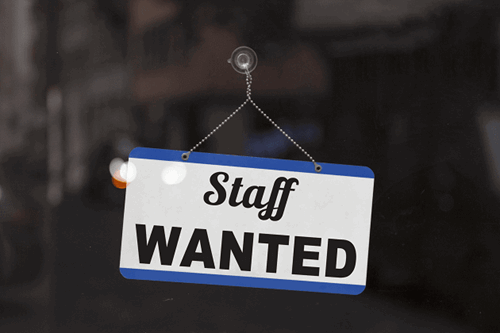Can running an understaffed business save you money and make it more profitable? Some business owners are inclined to think so, while evidence proves the opposite.
Understaffing problems impact negatively on staff wellbeing and retention, productivity and overall business success.
An understaffed business risks losing their staff to ill physical and mental health. Not only that, but you risk facing major difficulties in attracting new employees, as the biggest employment crisis in record in the UK has shown.
Avoid being trapped in such a situation. Talk to a Croner expert today to help you manage understaffing in the workplace and find a way forward.
This Croner guide will explain what understaffing is, how to spot the causes of it, and how workforce issues can impact your business.
What is understaffing?
Understaffing is when there’s too much work and not enough staff. It’s also known as being short staffed.
This seems pretty straight forward and fairly easy to monitor. However, not having enough staff will affect different industries and business differently. In certain circumstances, business owners don’t realise it until work-related incidents highlight their staffing issues.

Health and social care, as well as transport of goods are industries chronically affected by lack of staff in the UK. Shortages in these industries raise concerns year after year. While reasons can be complex and some are linked to global phenomena such as the Covid-19 pandemic, a valid question remains.
If such widespread shortages affect you, how do you minimise risks and keep your business not only operational, but also productive?
In order to find a suitable solution, you need to first look at what causes issues with staffing levels. We will talk next about the main causes of understaffing across various industries.
Identify the causes of understaffing
In the worse employment crisis on record in the UK, surveys identified the Covid-19 pandemic, global shortages and Brexit among possible causes.
Businesses can do little to control and prevent any of the above. Instead, you need to investigate the aspects you can address. Think about flexible and hybrid working, for example, as ways to contribute towards staff wellbeing and staff retention.
Let’s look at common causes of understaffing, and possible solutions:
- Lack of training
NHS data shows that lack of trained nurses and GPs causes understaffing in the UK health care system. The same applies to reoccurring HGV driver shortages.
Take apprentices on board and incentivise them to stay with the business. Re-train and promote your existing staff to prevent understaffing due to lack of training.
- Aging population
As an employer, you can’t control the aging population. But you can offer training to your older staff and make vacant positions appealing to young candidates.
- Underpayment
How do you make sure you don’t either underpay or overpay your staff?
Use our salary benchmarking tool to easily search 50,000 jobs across 34 sectors. Compare and decide how you need to pay your staff to improve retention and avoid overpayment at the same time.
- Long working hours
Working hours requirements differ from one industry to another. Industries such as health and social care, and manufacturing see 12 hour shifts as the norm. Employees are more likely to leave your business if staff shortages mean they’ve got to work long hours. This in turn increases understaffing related issues. Make sure your staff get adequate rest breaks to help with wellbeing and increase retention.
- Low staff morale
If your staff lose motivation, what will keep them coming back into work every day? Who wants employees to work for them only because they have no alternative?
By supporting their wellbeing, you can increase both retention and productivity. Our employee assistance programme (EAP) provides staff mental health support.
When faced with a widespread employment crisis, reducing understaffing levels will take time. Meanwhile, understanding how it affects your workforce will provide you with good insight on how to support your workers.
The effects of understaffing
When your existing employees are understaffed at work, stress will affect them one way or another. Industries always short staffed at work see chronic workplace stress and burnout more than others. When your existing staff suffer from burnout, their motivation and productivity decrease. As a result, both your workforce and your business will suffer.
Remember that burnout leaves your staff more vulnerable to workplace accidents and injuries, due to fatigue and lack of focus. The last thing you need when understaffed is a civil court claim for work related illnesses and injuries.
Unfortunately, understaffing in the workplace tends to perpetuate itself. Overworked, overtired, demotivated employees will look for a new workplace. They’ll leave heavily understaffed businesses, which then deepens the problem.
Don’t ignore situations when your business is short staffed, even if operations seem to be going well. You will find it more difficult to reverse the negative effects of understaffing once people start leaving because of burnout and ill health.
A fine balance between understaffing and overstaffing
While we see reoccurring understaffing issues affecting the UK economy, companies can experience overstaffing too. If you hire too many workers, overhead costs will increase.
It seems easy to avoid hiring too many employees. Finding the right staffing balance for your business can be more difficult than expected. Businesses need more employees in periods of boom and less in periods of stagnation or even decline.

Certain industries rely on temporary workers, such as retail and hospitality over Christmas and other holidays. When hiring temporary workers, a business still needs experienced, permanent staff to train and supervise them.
Watch out for subtle overstaffing within your business. If one team is constantly struggling with their workload, while another seems out of work, you definitely need to rethink and reach a balance.
Ask a Croner expert
When your whole industry is struggling, what can you do to reduce the impact of understaffing on your business? Your overworked staff are more at risk of work-related illness and injuries, and could quit working for you.
Avoid tribunal claims and losing staff to burnout by putting measures in place to tackle understaffing. Call our 24-hour HR advice line to speak to a Croner expert and find the right solution for your business, on 01455 858 132.
Related resources
Categories
- Business Advice
- Culture & Performance
- Disciplinary & Grievances
- Dismissals & Conduct
- Employee Conduct
- Employment Contracts and Documentation
- Employment Law
- Employment Rights Bill
- End of Contract
- Equality & Discrimination
- Health & Safety
- Hiring and Managing
- Leave & Absence
- Managing Health & Safety
- Moving
- Occupational Health
- Pay & Benefits
- Recruitment
- Risk & Welfare



